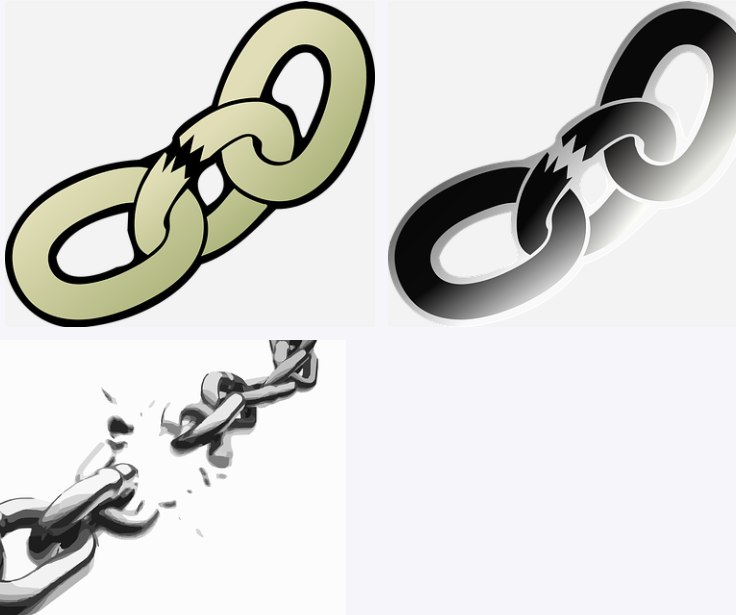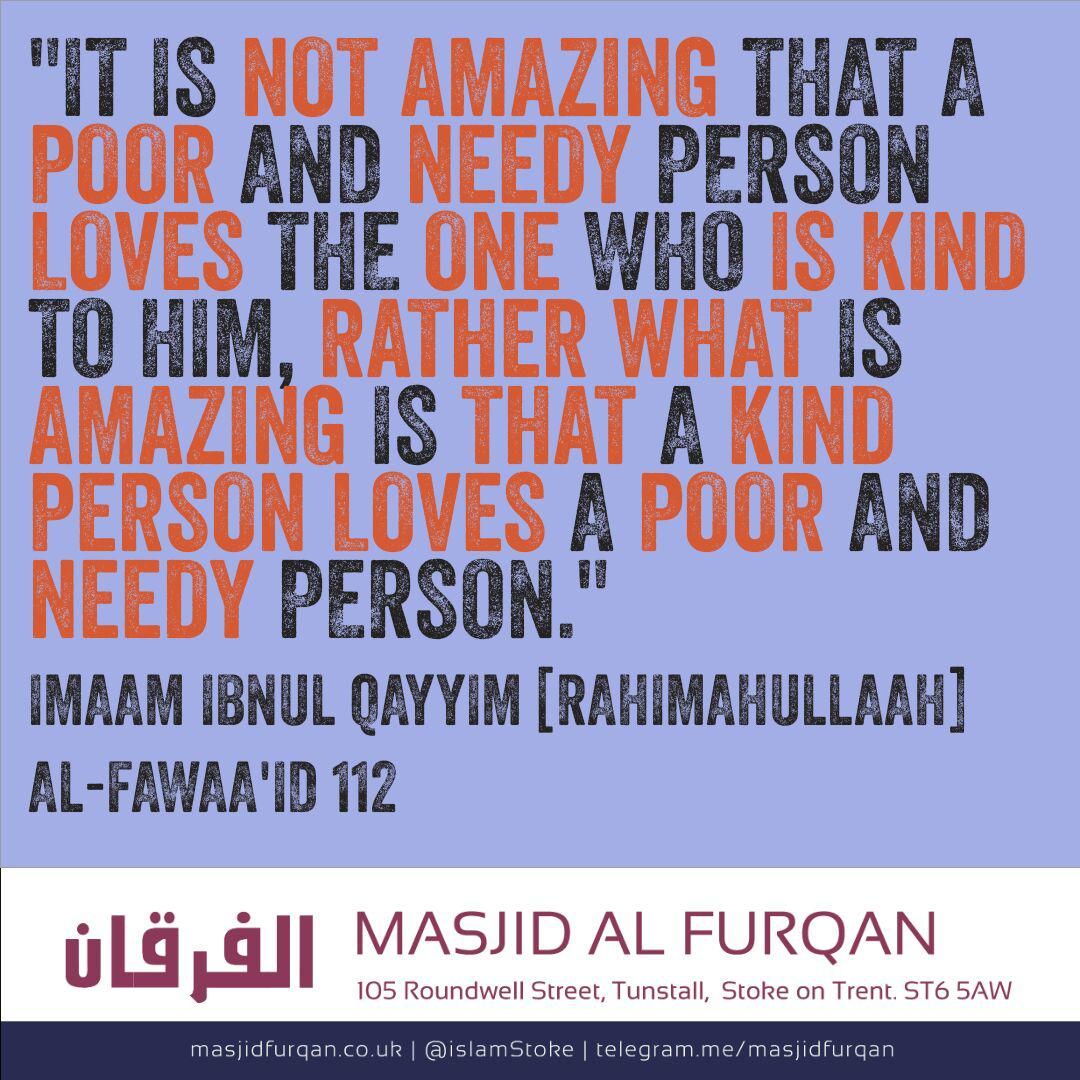In The Name of Allaah, The Most Merciful, The Bestower of Mercy.
[1] The first affair is that the poor have been commanded to be patient and accept Allah’s decree, along with everyone else who is unable to fulfill their own wishes. Allah stated. [ وَلَنَبۡلُوَنَّكُم بِشَىۡءٍ۬ مِّنَ ٱلۡخَوۡفِ وَٱلۡجُوعِ وَنَقۡصٍ۬ مِّنَ ٱلۡأَمۡوَٲلِ وَٱلۡأَنفُسِ وَٱلثَّمَرَٲتِۗ وَبَشِّرِ ٱلصَّـٰبِرِينَ – And certainly, We shall test you with something of fear, hunger, loss of wealth, lives and fruits, but give glad tidings to As-Sabirin (the patient ones, etc.)] [Surah Al-Baqarah. Aayah 155]
The patient-poor person receives a reward that is received by those who are patient and he is similar to the grateful wealthy person if they are equal in piety. They will both receive the recompense of those who are patient. (see footnote a)
[2] Accept the fact that Allah is All-Wise, has perfect judgment, is All-Wise in the handling of all matters, and that there are many advantages to this situation for the person.
Even if the impoverished person may hate their situation, it will be better and more advantageous for them when they meet their Lord. If he had been wealthy, maybe he would have been tested and distracted from his life’s purpose—which is to worship and obey Allaah alone—and that’s why his poverty may be better than being wealthy. And for this reason, the author transmitted the Aayah:
[وعسى أن تكرهوا شيئا وهو خير لكم وعسى أن تحبوا شيئا وهو شر لكم والله يعلم وأنتم لا تعلمون – and it may be that you dislike a thing which is good for you and that you like a thing which is bad for you. Allah knows but you do not know]. [Surah Al-Baqarah. Aayah 216]
Because of this, one should have absolute faith that Allah is in complete control of all affairs and is fully aware of all of His servants. A person who has this belief will be free from all sadness, become active, and start looking for a livelihood.
[3] Neither should they seek to remove their poverty and seek after their needs by depending on the people nor ask them except when it is unavoidable and necessary to do so.
[4] They should seek to end their poverty by relying solely on Allah. He has provided a number of activities and methods for doing this, and each person focuses on the ones that work best for them. By doing this, one is liberated from abject dependence and is given the tools necessary to fight against laziness and apathy. This includes two affairs:
(I) To seek Allah’s help, supplicate to Him constantly, ask Him to protect them from poverty and the trials of poverty, and ask Him for blessings by supplicating to Him with the Names Al-Wahhaab, Al-Muhsin, Al-Mannaan, Ar-Razzaaq, etc.
(II) Employ the means as Allah stated: [هُوَ ٱلَّذِى جَعَلَ لَكُمُ ٱلۡأَرۡضَ ذَلُولاً۬ فَٱمۡشُواْ فِى مَنَاكِبِہَا وَكُلُواْ مِن رِّزۡقِهِۦۖ وَإِلَيۡهِ ٱلنُّشُورُ -it is, Who has made the earth subservient to you (i.e. easy for you to walk, to live and to do agriculture on it, etc.), so walk in the path thereof and eat of His provision, and to Him will be the Resurrection]. [Surah Al-Mulk. Aayh 15]
So, even if the work he is doing does not satisfy him or does not provide a sufficient means of subsistence, a person strives to earn a living through lawful and divinely sanctioned means, gradually improves in their work, and continues to work until he finds another position that is more advantageous.
[5] Because of what Allah has bestowed upon the wealthy, one should not envy them. The wealthy are beneficiaries of Allah’s bounty and favour, thus the poor person should beware of envy since harbouring resentment against them for their prosperity is equivalent to opposing Allah’s blessings. Yes, a person may wish to possess something that another person has, and this is known as Ghibtah (i.e., to wish for the thing, but not to envy the person); however, it is prohibited if one despises the blessing that has been bestowed on another person, wishes that the blessing should end, or attempts to stop it. Just as one wouldn’t want to be envied or have someone try to hinder them from receiving a blessing, one should also not behave in this manner towards others.
[6] They should be truthful in their work, mutual dealings, and professions. Because these are some of the ways to achieve Barakah (blessing) in one’s livelihood as opposed to the affairs of those who cheat in their dealings, lie, behave badly, etc. They should be sincere, and truthful, and treat people in a good manner.
[7] Should not rush to find a means of livelihood by engaging in vile gains that rob one of upright adherence to the religion as well as corrupt worldly affairs. Some people who are impoverished desire to end their poverty without caring how it happens, thus they don’t care if engaged in usury, theft, transgression, deception, or lying. Another thing to be careful of is visits to sorcerers, magicians, and soothsayers in the hopes of obtaining amulets from them to end poverty. So, when one of them wants to start a business, he consults a sorcerer for advice on his venture or his voyage, or he consults a magician. This is tantamount to desecration of one’s religion. Similarly, one should avoid placing their hopes on the deceased in the graves, as some ignorant people do when they seek to find a solution, by invoking and making vows to them. This is tantamount to Shirk!
[8] Allaah gave them two instructions that would ease their suffering from poverty: economisation and to be content with what Allaah has given them, (since) little sustenance combined with wise economisation brings about a lot of good. Richness without wealth can only be found through contentment.
[9] Food, drink, a place to live, and transportation should all be within a person’s means of affordability. This is crucial since many people spend beyond their means and incur debts that they are unable to pay back, even if they could have lived within their means. Thus, with economization, little income money becomes abundant, and a person is blessed with what little he has. However, if not content with economization, then this would injure them.
[10] To be satisfied with what one has. The Prophet [peace and blessings of Allaah be upon him] said, “Wealth is not in having many possessions, but rather true wealth is the richness of the soul”. [Hadeeth Number 6446] The Prophet [peace and blessings of Allaah be upon him] said, “‘’Whoever among you wakes up [in the morning] safe in his property, healthy in his body and has his daily nourishment, it is as if he has been granted the entire world”. [Sunan Ibn Maajah. Hadeeth 4141]
[11] The ability to economise and be contented brings about blessings for some poor people. They neither wish for what the luxurious people possess nor feel bitter about their little income.
[12] Not to look at those above you, rather look at those below lest you belittle the blessings of Allah that have been bestowed upon you. Do look at the one who has more wealth or trade than you, or the one with a better house, a better livelihood, or means of transport, but rather look at the one who is below you. That is because when you look at the one who has less wealth, you’ll say “Alhamdulil laah”. But if you look at the one above, you’ll belittle the blessings you have and then say, “I don’t have anything”, and you forget the many other blessings, such as the blessing of Islam, the blessing of good health, the blessing of a dwelling place, the blessing of safety, the blessing of children, etc. The Prophet [peace and blessings of Allaah be upon him] said: “Look at those who are below you and do not look at those above you, for it is more suitable lest you look down on Allaah’s blessings”. [Saheeh Muslim. Hadeeth Number 2963]
[13] When the poor people are guided by the guidance of the religion to exercise patience and attach themselves to Allaah, freed from abject dependence, working hard and striving in honorable and beneficial deeds and satisfied with Allaah’s grace, the burden and difficulty of poverty will be eased for them. In addition to this, they do not cease striving for self-sufficient (and to obtain more provision), hoping for the bounty of their Lord, awaiting His promise and fearing Him. Allaah said: [ومن يتق الله يجعل له مخرجا ويرزقه من حيث لا يحتسب – And whosoever fears Allah and keeps his duty to Him, He will make a way for him to get out (from every difficulty)]. [ ومن يتوكل على الله فهو حسبه – And whosoever puts his trust in Allah, then He will suffice him]. [Surah At-Talaaq. Aayaat 2-3]
Taqwah [Fear of Allaah] is to act in obedience to Allaah upon a light from Allaah [i.e. Eemaan, sincerity, guidance, etc] and hope for reward from Allah. And you abandon disobedience to Allah upon a light from Allah and fearing the punishment of Allah.
[14] Increase in Istighfaar – seeking Allaah’s forgiveness. Allaah said [that Prophet Nooh (peace be upon him) said to his people]:
فَقُلۡتُ ٱسۡتَغۡفِرُواْ رَبَّكُمۡ إِنَّهُ ۥ كَانَ غَفَّارً۬ا
يُرۡسِلِ ٱلسَّمَآءَ عَلَيۡكُم مِّدۡرَارً۬ا
وَيُمۡدِدۡكُم بِأَمۡوَٲلٍ۬ وَبَنِينَ وَيَجۡعَل لَّكُمۡ جَنَّـٰتٍ۬ وَيَجۡعَل لَّكُمۡ أَنۡہَـٰرً۬ا
I said (to them): “Ask forgiveness from your Lord; Verily, He is Oft-Forgiving; He will send rain to you in abundance; and give you increase in wealth and children, and bestow on you gardens and bestow on you rivers”. [Surah Nooh. Aayaat 10-12]
So, when a person has little, he should increase in Istighfaar. A man came to Imaam al-Hasan Al-Basri [may Allaah have mercy upon him] and complained about poverty, so he said to him, “Seek Allaah’s forgiveness”. A second man came to him and complained to him about not having children, he said to him, “Seek Allaah’s forgiveness”. Another one came to him and complain about his orchard that it is dry, he said to him, “Seek Allaah’s forgiveness”. So, a man who was present said to him, “Everyone who came to you was told to seek Allaah’s forgiveness!” He replied, “I did not say more than what is in the Qur’aan”, then he recited:
فَقُلۡتُ ٱسۡتَغۡفِرُواْ رَبَّكُمۡ إِنَّهُ ۥ كَانَ غَفَّارً۬ا
يُرۡسِلِ ٱلسَّمَآءَ عَلَيۡكُم مِّدۡرَارً۬ا
وَيُمۡدِدۡكُم بِأَمۡوَٲلٍ۬ وَبَنِينَ وَيَجۡعَل لَّكُمۡ جَنَّـٰتٍ۬ وَيَجۡعَل لَّكُمۡ أَنۡہَـٰرً۬ا
I said (to them): “Ask forgiveness from your Lord; Verily, He is Oft-Forgiving; He will send rain to you in abundance; and give you increase in wealth and children, and bestow on you gardens and bestow on you rivers”. [Surah Nooh. Aayaat 10-12] In these Aayaat, Allaah mentioned Istighfaar and then mentioned its worldly fruitful outcomes. As for in the afterlife, the Prophet [peace and blessings of Allaah be upon him] said: “Glad tidings to those who find a lot of seeking forgiveness in the record of their deeds”. [Sunan Ibn Maajah. Hadeeth Number 3818]
[15] The person should not rely upon the means he employs to seek provision, rather he should rely and depend on Allaah alone. Allaah said: [ومن يتوكل على الله فهو حسبه – And whosoever puts his trust in Allah, then He will suffice him].
So, the person employs the means and is eager in seeking what benefits him, such as trade or some craftmanship, but he relies upon Allaah alone. The Prophet said that when one – whilst leaving his (or her) home – says: [بِسْمِ اللَّهِ تَوَكَّلْتُ عَلَى اللَّهِ لَا حَوْلَ وَلَا قُوَّةَ إِلَّا بِاللَّهِ – In the name of Allah, I trust in Allah for there is no movement or might but in Allah], it will be said to him that you have been sufficed and protected, and the devils will be far from him. [Saheeh Sunan Tirmidhee. Hadeeth Number 3426] [Sharh Ad-Deenus Saheeh Yahillu Jamee Al-Mashaakil. Lesson 4]
Footnote a: Narrated AbuKabshah Al-An’maariy (radiyallaahu-anhu) that Prophet (sallal-laahu-alayhi-wasallam) said: “I swear by Allah regarding three (affairs) which I am going to tell, so remember them. The wealth of a man does not decrease due to (giving) charity; a slave does not exercise patience when oppressed, except that Allah increases his honour; a slave does not open the door of begging, except that Allaah opens for him the door of poverty (or he stated a statement similar to it).” I am going to tell you (something), so remember it: The worldly life is for four types of people. A slave whom Allaah has given wealth and knowledge, so he fears his Lord by way of it. He preserves the ties of kinship and acknowledges Allaah’s Rights regarding it. This (type of person) is on the most virtuous position. A slave whom Allaah has given knowledge but not wealth. He is truthful in his intention and says: `If I had wealth, I would have done the deed of such and such (person).’’ So because of this intention of his, his reward is the same (i.e. the righteous one who has been given wealth and knowledge). A slave whom Allaah has given wealth but not knowledge. He wastes his wealth out of ignorance. He neither fears Allaah nor does he keep the ties of kinship, nor does he acknowledge Allaah’s rights. This (type of person) is at the evilest position. A slave whom Allaah has neither given wealth nor knowledge and he says: `If I had wealth, I would have done the deed of such and such (person).’’ So by way of his intention, they are similar (i.e. similar to the evil person who wastes his wealth). [1]
Shaikh Ubaid (may Allaah preserve him) stated: The first is a wealthy person who is thankful (to Allaah); so Allaah will raise him to the most virtuous position due to his deed. The second is a poor person who exercises patience. He is truthful in his intention with regards to spending from that which Allaah has bestowed on him. So Allaah makes him reach the most virtuous position due to his truthful intention. The third is a boastful wealthy person. He is covetous and stingy; so his deed takes him to the most evil position. The fourth is a boastful poor person and his intention is evil. So together with his poverty, his intention takes him to the most evil position. So based on this, we know that by way of truthful intentions Allaah raises the person. And an evil intention debases a person until he finds him/herself in the most evil position. [2]
[1]Reported by Tirmidhee 2325; Ahmad 18031; Al-Baghawiy 4097; [2] An Excerpt from: البيان المرصع شرح القواعد الأربع- pages 8-9. Slightly paraphrased






